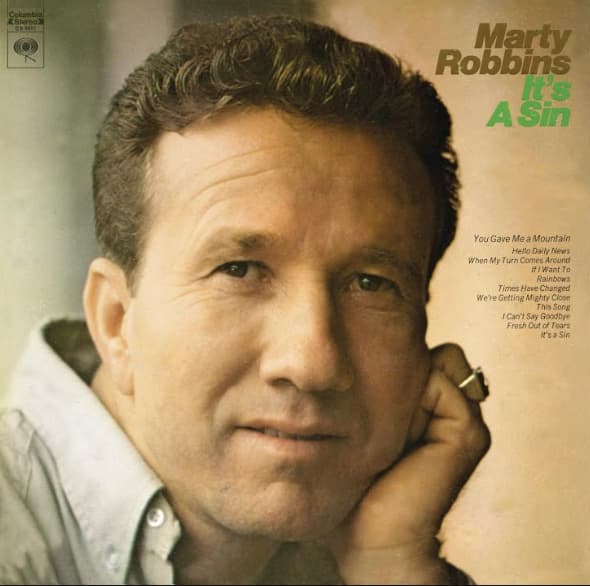
An Anthem for the Heart’s Hesitation
It’s a feeling as old as time itself, the ache of an ending you can’t quite bring yourself to face. The melody of a memory, of a love that’s faded but refuses to let go. This is the profound and delicate emotional landscape of “I Can’t Say Goodbye,” a song that perfectly captures the internal conflict of holding on to a love that’s already gone. Released in 1969, this track by the legendary Marty Robbins became an essential piece of his expansive musical tapestry, a testament to his unique ability to convey deep, heartfelt emotion through song.
The song appeared on the album It’s a Sin, which itself was a commercial success, reaching a peak position of No. 6 on the Billboard Country Albums chart and staying on the chart for 29 weeks. The single “I Can’t Say Goodbye” followed suit, earning a spot on the Country Singles chart where it peaked at No. 8. These numbers, while impressive, only tell a fraction of the story. The real triumph of this song, and of Marty Robbins’ career, lies not in its chart positions but in its enduring connection with listeners.
To truly understand “I Can’t Say Goodbye,” one must appreciate the man behind the music. Marty Robbins was a complex figure, a renaissance man of country music who was as comfortable on the racetrack as he was on the stage. He had a rich baritone voice that could be both powerful and tender, and he used it to tell stories that resonated deeply with the human experience. Born in a small shack in the Arizona desert, his life was marked by both a hardscrabble existence and a deep, abiding love for music. He taught himself to play guitar while serving in the U.S. Navy during World War II, and it was through his music that he found his true calling.
This song, in particular, showcases Robbins‘ remarkable talent for conveying vulnerability and sorrow. The lyrics, written by Joy Byers and Rink Hardin, speak to a universal truth: that sometimes, the hardest thing to do isn’t leaving, but admitting that the time to leave has come. The song’s narrator is caught in a painful limbo, a place where a new love is waiting “just outside,” but the memory of a past love is so strong that he simply can’t move on. It’s a poignant portrayal of a heart torn in two, a struggle that many of us, at one point or another, have faced. The soulful, almost mournful quality of Robbins‘ voice makes the listener feel the weight of this decision, the hesitation and the lingering attachment. It’s a moment of raw, honest emotion that reminds us that even when we know what we should do, the heart has its own stubborn logic.